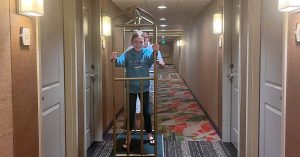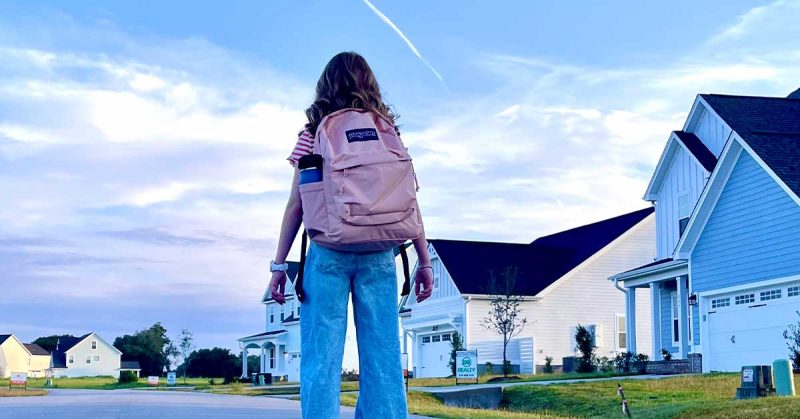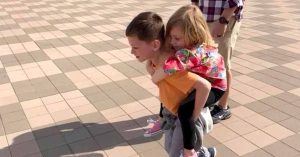That was then…
I grew up in a little town just outside the gates of a naval air station — the same air station my grandpa retired from. This connection to the military through my grandpa’s service might lead you to assume I had a working knowledge of military life, but — to be clear — I did not. My childhood was peppered with friendships with military kids. I didn’t know they were military kids until they up and vanished one day with or without a sendoff.
Each year, new faces would appear in a classroom that was otherwise full of the same ole (not old — I feel the need to emphasize this since we’ve just had our 20-year high school reunion) faces. Each year faces would disappear with as little fanfare as they arrived. I began to get wise to the fact that our school was a revolving door for military kids in late elementary, and even with that knowledge, I still lacked the basic understanding of what it meant to be a military kid. For example, I knew their presence was temporary, but “temporary” and the passage of time looked much different from the little plastic chair in an elementary classroom. Whether a new face would be with us for a month or all year, was an absolute mystery to me. I also assumed their military parent was one hundred percent deployed all the time and that they only lived on base. I’m sure I was operating under many more inaccuracies, but many years and experiences have knocked non-essential ideas out of my head.
I remember feeling sorry for these kids for having a parent gone constantly and moving around so often. I was painfully shy (90s terminology for an introvert with social anxiety) and couldn’t imagine the stress of having to make new friends every time orders dropped. It pained me that they would never have life-long friends or a hometown. I remember thinking at a young age that they must be so lonely.

This is now…
Can you just imagine the amount of time my face winced typing the last three paragraphs? Little clueless me had — for the most part — no idea what she was talking about. I know now, after watching my children experience things as kids that I never expected to see in my lifetime, that military kids are not so much the loneliest people in the room. They are the most interesting from all the places they’ve traveled and friends they met from all over the world, the most resilient from all the starting over they’ve had to do, and the most independent from those periods of separation and finding their footing in a new place. The most mature from a combination of all of it. They didn’t need my misplaced pity back then, and they don’t need it now. What they do need, however, is community — a peer group that understands their ups and downs without having to start at the beginning with a lengthy explanation.

The Military Kids Club
There is truly nothing I love more than having a great idea for the military community and finding that it already exists. Parents, you may vaguely remember signing a permission slip at the beginning of the school year okaying your child’s participation in military-child-specific counseling activities. You may have had the choice of one-on-one and group activities. I could make the case for both settings, so I opt-in for both when given the opportunity.
In our youngest daughter’s current school, this group counseling session is thriving. It’s a weekly session that I hear about every Thursday afternoon. Participating has allowed our daughter a chance to quickly identify her “tribe” in a new school — the people who know without a lengthy explanation exactly what she means when she says her dad is a Marine who just got stationed here. She’s even spotted a familiar face from our time at another duty station an ocean away from here which is such an “it’s a small Marine Corps” moment, and I love this for her.
This “club” as she refers to it, is something she looks forward to every week. There is always something fun in store, and — at least in the dramatic tween way she recounts it — its exclusivity has earned it some major cool points. Rest assured, no one at her school is pitying her and her military-kid peers. This club has given her an air of confidence in a new place. It’s given her a safe space where she knows she will always be understood when she lays into a random story about something she experienced in Japan or California. It’s given her a network within her school, both with a trusted adult and trusted peers that she knows she can turn to if she is ever facing one of those rough military kid moments — like missing her friends from another duty station or missing her dad while he’s away.

If you don’t remember such a permission slip, I’ve got some theories:
- You may be in a private school.
- You may be in a DODEA school. Not all DODEA schools are the same, but I don’t remember specific instances of pull-out counseling for military kids because — well — they’re almost all military kids. The tribe that this club identifies is already all around your child in a DODEA school. Like any school, one-on-one counseling options are available.
- You may not have seen the permission slip in the barrage of papers coming home that first month of school.
- You may have seen it, read it, but thought maybe that wasn’t for you or your child. That’s fine but know that this option is still available if you think your child could benefit from it at any point in the school year.
If you’re using these services at your child’s school and love what you’re hearing, let someone know. These counselors and sessions are not promised, so positive feedback goes a long way.
If you aren’t using these services, but you’d like to, contact your child’s school and military liaison. You’ll be asking about the availability of a military child-specific counseling program. This could be the school counselor who specializes in specific programming, or a child and youth behavioral military and family life counselor assigned to your child’s school. If no such professional or program exists, I’d give you the same advice I gave to the parents who know and use the services: Say something. Give your school and your military liaison feedback; let them know you’d like this extra support for your child and the other military children at your school.
I hope for you and for your resilient, amazing kiddos that they find their place and their people in their current school. I hope they don’t downplay how incredible they are to fit in. I hope they’re proud of their parents’ service and the amazing opportunities it’s given them. I hope you have your own enthusiastic Thursday (or whichever day of the week it happens for you) recount of the day’s meeting of the military kids’ club.





